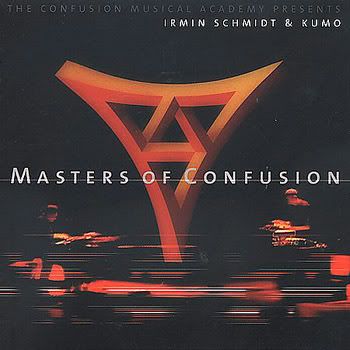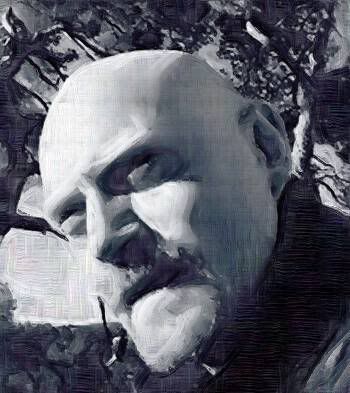
Irmin Schmidt & Kumo - Masters Of Confusion - 2001 - Spoon Records
The album is a brilliant collaboration from two artists from completely different musical backgrounds, Kumo's electronic dancefloor rhythms collide with the classical beauty of Irmin's grand piano to great effect and the result is a successful blend of raging rock, contemporary composition, techno and drum 'n' bass. Check out Can's brilliant Tago Mago album, and there is info on Irmin Schmidt's 1991 Impossible Holidays album @ ISCHMIDT/IMPHOL
TRACKS
1 Goatfooted Balloonman (6:11)
2 Las Plumas Del Búho (8:19)
3 Burning Straw In Sky (11:22)
4 Those Fuzzy Things (Out There) (5:29)
5 Fledermenschen (6:31)
6 Beauty Duty (5:44)
7 Gentle Into That Night (Gormenghast Drift V. 5.2) (8:18)
8 Either Or The Survivor (7:40)
All tracks composed by Irmin Schmidt. Recorded live on stage as part of CAN-Solo-Projects-Concerts : track 5 at Crossing Border Festival Den Haag -Holland 6.10.1999 , track 7 at Barbican Hall London - England 9.10.1999, track 8 at Jazz Festival Amiens - France 31.3.2000
CREDITS
Irmin Schmidt (Piano), Irmin Schmidt (Keyboards), Irmin Schmidt (Producer), Irmin Schmidt (Main Performer), Kumo (Producer), Kumo (Engineer), Kumo (Mixing), Kumo (Electronics)
REVIEWS
Masters of Confusion is taken from three live sets recorded by veteran CAN keyboardist Irmin Schmidt and drum'n'bass artist Kumo. And that's basically what it consists of; piano and electronic drums, with only subtle sampling and external keyboard effects. The live crowd at these concerts, which featured excerpts from Schmidt's opera Gromenghast, isn't even faintly apparent on these recordings until you get to track seven, which will prove a relief to some listeners. Sound throughout has the resolution of a studio recording, and "Goatfooted Baloonman" is the best of the album's cuts, as Schmidt and Kumo mix up techno and keyboard licks into a stew that resembles Martin Denny meets Stravinsky. "Las Plumas de Bluho" and "Burning Straw in the Sky" settle more into a Bulgarian feel in the piano, with funk invading the drum work on the third track, ultimately going on a bit too long. "Those Funny Things (Out There)" consists of jazzy disco Muzak in the outer parts and spacey prepared piano in the middle. "Fledermenschen" picks up your ears a good deal at this point, and the drums dominate the middle of this number. "Beauty Duty" resembles the sound of CAN more than anything else on this disc. "Gentle Into the Night" is a very lush piece that is reminiscent of both Martin Denny and Charles Ives, with a fair amount of wailing theremin-like sounds. The last piece, "Either or the Survivor," is the loosest of the disc, and also the weakest. While neither fish nor fowl, Masters of Confusion is a strong effort that brings out, in it's best moments, some fine work from both Schmidt and Kumo. In its weak spots the disc is not so much annoying as you're just waiting for something to happen. Fans of CAN will doubtless find it interesting, but electronica buffs may find Masters of Confusion pleasurable as well, and should not ignore this release due to the presence of the "old guy." © Uncle Dave Lewis, All Music Guide
Here we have two men with a passion for music and the secrets it holds. Irwin Schmidt was a founding member of the hugely influential German avant-garde rock group Can and for some time now he's been collaborating with Jono Podmore, best known as Kumo, drum programmer and sound engineer extraordinaire. Masters of Confusion is the first recorded evidence of their work, and it's pretty mental. The results are, by and large, maniacally classical and for the first two tracks it appears Irwin and Kumo are desperately trying to outrace each other, relentless in their pursuit. An accompaniment to the rat race if you like. The sound is remarkably live (in fact three of the pieces were recorded under just such conditions) and the elaborately choreographed piano action is wonderfully flamboyant. From the opening streaming electronic data and dancing piano fingers, the mood grows darker and churns atmospherically, becoming ever more imposing, even horrifyingly spiralling into crashing and smashing. Masters of Confusion thrives on spontaneity and the structural experience of it's creators. It is both a wild behemoth tormented by breakbeat and an unpredictable cascade of stimulants. © Andrew, September 2001, © Remote Induction 2001, http://rem_ind.tripod.com/audio/cnfsdspn.htm
ABOUT KUMO (JONO PODMORE)

Jono Podmore aka Kumo began to play the violin at the age of 10, and later the guitar. He studied electronic music at Middlesex University and by 1986, Jono was composing music for plays and TV. After a stay in Japan (where he continued his studies in Karate), he returned to London in 1990 to work as an engineer, producer and string arranger with artists such as Jamiroquai, The Shamen, Ian McCulloch, Robert Owens and Republica, amongst others. In 1997 under the name Kumo, he released his 1st and critically acclaimed solo album Kaminari. Since the success of Kaminari with gigs and DJ commitments world-wide, he has worked closely with Irmin Schmidt and the entire Can family - most notably on Gormenghast, Schmidt's opera, the album Masters of Confusion and international touring as Irmin Schmidt and Kumo. He has also developed co-productions with Jose Padilla (Café del Mar), Tim Simenon (Bomb the Bass), BJ Cole and Jaki Liebezeit. He has continued with his own solo work, and released a second album entitled 1+1=1 in Autumn 2000 on Spoon records, with live work in the U.K, Japan, Spain, Germany and France. A 3 track EP Kumo and Friends is now available on Electric Tones records. He currently splits his time between Köln and London.
ABOUT IRMIN SCHMIDT

Irmin Schmidt born in May 1937 received a formal musical education and between 1957 and 1967 he studied under modern composers Karlheinz Stockhausen and Ligeti. Between 1962 and 1969 he conducted numerous orchestras including Wiener Sinfoniker, Bochumer Sinfoniker, Radio-Sinfonie-Orchester Norddeutscher Rundfunk Hannover and the Dortmunder Ensemble für Neue Musik, which he founded. Schmidt also worked as a musical director at the Stadttheater Aachen and taught Musicals and Chanson at the Bochum stage school. Schmidt also gave numerous new music recitals and was amongst the first German pianists to interpret the work of John Cage. His compositions "Hexapussy" and "Ilgom" were premiered by Radio Stuttgart in 1967 and 1968 respectively. During this period he also composed music for various film and theatre productions. His classical career was put on hold after a trip to New York in 1966 exposed him to emerging musical forms and ideas that led to him forming CAN in 1968. As the band's keyboard player, Schmidt's contribution to their groundbreaking career and the evolution of electronic music in general is formidable. When CAN was dissolved in 1978 Schmidt, relocated to the south of France where he established a studio and continued to compose and record over 100 film and television scores, a craft he had already become familiar with both before and during his work with CAN. This work is documented on CAN's "Soundtracks" LP (1970) and on his own solo soundtrack compilation, a 3 CD set entitled "Anthology:Soundtracks 1978 - 1993 "both of which are available on Spoon/Mute. His solo soundtrack features his fellow band mates Micael Karoli (guitar) and Jaki Liebezeit (drums). In 1981 he worked with Bruno Spoerri and released his first solo LP "Toy Planet" followed by "Musk at Dusk" in 1987. Schmidt rejoined his former colleagues for the reunion album, Rite Time (1989) and followed this with another solo album, "Impossible Holidays" (1991). In 1993, Schmidt was commissioned to write a fantasy opera based on Mervyn Peake's Gormenghast trilogy. The three act opera, with a libretto by Duncan Fallowell, was premiered at Wuppertal Opera House on November 15 1998 excerpts of which were released as a CD on Spoon/Mute in 2000 Thanks to Gormenghast, he met Kumo (UK musician Jono Podmore), sound engineer, producer and specialist in rhythm programming and immediately saw the potential for improvisational collaboration. They performed as Irmin Schmidt and Kumo for the Can solo projects tour. This project also toured events as diverse as the Montreux Jazz Festival, Sonar in Barcelona and the International Jazz festival in London and all to critical acclaim from their respective audiences. In 2001 Irmin Schmidt and Kumo released "Masters of Confusion" on Spoon/Mute. Like his fellow CAN bandmates, Irmin Schmidt has been taking a keen interest in the re-mastering of CAN material for both the 2003 CAN DVD release and overseeing the re-mastering of the entire CAN back catalogue for re-release on Spoon/Mute. June 2004 saw a new production of his Gormenghast opera staged at Völklinger Hütte in Saarbrücken, Germany, a colossal steelworks that is now a UNESCO world heritage site, together with performances at the Grand Theatre Luxembourg. In 2006 - 2007 he composed ballet music for full orchestra commissioned by the Deutschen Oper am Rhein, Düsseldorf. In 2008 the ballet was premiered in Düsseldorf and Duisburg. This year also saw the release of the new Irmin Schmidt & Kumo album "Axolotl Eyes" (released world wide by Spoon/Mute/Warner/P-Vine) and he wrote the soundtrack to the new Wim Wenders film "Palermo Shooting", which is part of the official selection of the Cannes Film Festival 2008. © Spoon Records, All rights reserved.
BIO / ALBUM [Billboard]
Irmin Schmidt & Kumo’s first album, Masters of Confusion released in 2001, was born out of the studio work around Irmin Schmidt’s opera Gormenghast when Kumo, a.k.a. producer, programmer and sound-designer Jono Podmore, was drafted in in 1997 on the recomendation of manager and impressario Jazz Summers to assist Schmidt with the creation of the work. The duo, who make an intense and unique form of music that feeds off their respective musical histories, first played live on the Can-Solo-Projects tour which marked the 30th anniversary of the group, and have since continued to play live regularly. In 2001 they created the multi-channel sound installation Flies, Guys and Choirs as a commission for the Barbican Centre in London. They are currently working on a second album - which will include a DVD of Flies, Guys and Choirs - due for release in Summer 2007. Irmin Schmidt’s work with the seminal and highly repected Can is well documented, but between 1957 and 1964, Schmidt studied piano and french horn, composition under Ligeti and Stockhausen alongside conducting with Istvan Kertesz amongst others. As a conductor he won several prestigious awards including the Folkwang Leistungs-Preis in 1963 and the 1st Prize at the Mozarteum, Salzburg in 1964. Between 1962 and 1969 Schmidt conducted numerous orchestras including Wiener Sinfoniker, Bochumer Sinfoniker, Radio-Sinfonie-Orchester Norddeutscher Rundfunk Hannover and the Dortmunder Ensemble für Neue Musik which he founded. Schmidt also gave numerous new music recitals and was amongst the first German pianists to interpret the work of John Cage. His compositions Hexapussy and Ilgom were premiered in 1967 and 1968 by Radio Stuttgart. He worked as a musical director at the Stadttheater Aachen and taught at the Bochum stage school. He also composed music for various film and theatre productions. His post-Can work includes three solo albums, nearly 100 film scores, the three CD anthology Soundtracks 1978-1993, the opera Gormenghast and Masters of Confusion with Kumo. Throughout this body of work, Schmidt continues his habit of making music that embraces all forms while sounding like nobody else. The fantasy opera Gormenghast premiered in the Wuppertal Opera House in 1999. A second production premiered in Saarbrücken and Luxembourg in 2004. Times critic Rodney Milnes wrote: “If Richard Strauss had written rock music, this is what it would have sounded like - gloriously, unashamedly lush.” Excerpts were released as a CD in January 2000 (Spoon 44). Schmidt is currently composing a Ballet for full orchestra, comissioned by the Ballett der Deutschen Oper Am Rhein Düsseldorf. Choreographed by Youri Vamos, the ballet is scheduled to be premiered in Düsseldorf, Tallin, Prague and Riga throughout 2008. Jono Podmore was born in Liverpool in 1965 and began to play violin at the age of 10. He left Liverpool to study electronic music at Middlesex University in 1983. By 1986 Podmore was composing music for theatre and TV (Eugene Ionesco´s Journeys Among The Dead and Stanley´s Vision for Channel 4) and together with Peter Hope released the album Dry Hip Rotation. In 1987 Podmore joined The Corn Dollies as violinist and string arranger. Following the split of the band in 1990, he went to Japan to continue his studies in Karate. On returning to London he began working as an engineer, producer and string arranger with artists such as Jamiroquai, The Shamen, Jhelisa, Ian McCulloch, Robert Owens, D*Note, Republica, Sunship, A.P.E. and Kid Loops whilst continuing to compose and produce music for stage and screen. In 1994, together with Mr. C of The Shamen, he set up Watershed Studios and began to work with Plink Plonk Records. Podmore also started to compose and record under the name Kumo and founded 2 sister labels to Plink Plonk: Autoi (Drum n’ Bass) and Psychomat (Abstract Beats/Trip Hop). After a string of singles and remixes as Kumo, March 1997 saw the release of his first album Kaminari - to significant critical acclaim. A series of live shows and DJ gigs followed, including the Essential Music Festival in Brighton, the Sonar festival in Barcelona, and the Graz Biennale in Austria. 1997 was also the year that Podmore moved temporarily to France to work with Irmin Schmidt on the Gormenghast project – which lead to Masters of Confusion. Alongside Masters of Confusion, Jono has continued his work as producer, engineer, programmer and arranger with artists such as Tim Simenon a.k.a. Bomb The Bass, José Padilla (Cafe del Mar compiler and DJ), Jaki Liebezeit, Corker Conboy and many others. He also worked on a number of film and TV productions including The Hamburg Cell by Antonia Bird and wrote orchestral arrangements for the film Drei Grad Kälter (Silver Leopard at the 58th Locarno Film Festival 2005) performed by the Nüremburg Sinfoniker. Kumo’s 2nd album 1+1=1 was released in 2000 on Spoon Records as part of the Can Connection Edition series, followed by the Kumo and Friends EP on Electric Tones records (2003) and a collaboration with BJ Cole on the album Trouble in Paradise (2004). He worked closely with Spoon records on the Can DVD, remixing Can in 5.1, producing the Can Solo Projects CD, and remastering the entire Can back catalogue In November 2004 Jono was appointed Professor of Popular Music at the Köln Musikhochschule (Cologne University of Music) where he runs regular practical workshops ranging from dub reggae to music business, composing for film to house music. As work began on the 2nd Irmin Schmidt and Kumo album, the duo also made remixes (incl. P.I.L); performed live and gave workshops in Germany and Portugal; and, produced the album dot i/o for Japanese artist Mito Ichikawa. Other recent and ongoing work includes: composition for the series of art installations Tatlin's Tower and the World; mixing the debut albums of Sun Zoom Spark and Icelandic artist Biggi Orn Steinarsson; mixing jingles for FIFA for the 2006 World Cup; recording an album with Thai band Futon in Bangkok; studio and live work with U.K label City Rockers; and new series of recordings with Jaki Liebezeit. In February 2007 Irmin Schmidt & Kumo composed the music for German film Einsatz in Hamburg. Jono lives in London with his wife Sandra (Irmin Schmidt’s daughter) and their daughter Lara. © 2006-2008 Virb Inc. All rights reserved





3 comments:
LINK Pt 1
LINK Pt 2
absolutely glorious & amazing stuff...
thanx a bunch, have a nice weekend and keep up the fantastic job.
Hey, dukester! Thanks a million for comment. Schmidt is a genius, and Can produced some magnificent albums. I will be doing more research on Kumo. Keep in touch with A.O.O.F.C
Post a Comment